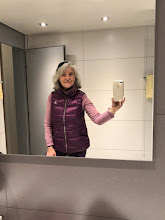I have never ever heard of Camino de Santiago until, in 1992 I, Richard, and all four girls went on a road trip to Spain. Unknowingly, we followed what is roughly Camino del Norte. We saw some backpackers along the way, and found out the are on peregrinacion verso Santiago.
Contrary to what many people think they know of life in a communist state, we were quite free in Poland. Comparatively free. In particular during "my times": under First Secretary of the Party, Edward Gierek. We were somehow free, sometimes more, sometimes less, to express - at least a little - our rebellion against the regime, and we were free to worship. Catholic Church held so much sway in the hearts and minds and spirits and lives in general, that it basically had to be left alone. It must have been with some kind of approval from the Soviets, they must have known the power of Polish faith, that must have been the only thing they were afraid of. Otherwise, why would the have permitted it to go on right under their noses, and why only in Poland to such a degree.
That was not a question. Just a statement.
Yes, you could meet members of the Party regularly every Sunday at a mass at your local church. And every one of them pretended they do not see their Party colleagues there. On so it went on for great many years. Don't see and don't tell. And most Party members, even high up in the hierarchy, got married at a church, baptized their children, their children went to First Communion, they held funerals there for members of their families. Not all, but most. Probably army officers were the ones who with most discipline stayed away from Church, and kept their families from it.
Here was our Great Chance: catholic or not, christian or not, believer or not. We were all united under the Church's security blanket. That was where we were free. We all knew, which priest will help us, to which seminarium can we go for our clandestine meetings, what monastery will welcome us without asking any, any questions. We can do as we please, we will know beforehand when it is not safe to stay anymore. And the annual meeting of like-minded was held always on the same date, August 15, in Czestochowa, the holiest shrine in Poland, on the holy day of Mother Mary, protectoress of Polish nation since at least Swedish wars, the Deluge. Very significant for a Polish mind. So significant, that there was never ever any interference from the "wladze", or government forces of any kind. Even policemen (milicjant) were nice to us. It was not that we were safe on the grounds of the shrine. We were free in the whole city. Yes, officially we were pilgrims come to Czestochowa, but it was an open secret that those in tents are not ordidnary pilgrims but rebellious youth and those who sympatize with their cause. "Hippies", is what we were called, but you could be not slightly mistaken if you thought we were what hippies were, much earlier of course, in the West. That form of the movement was particular only to Poland. It never happened to exist anywhere else, apparently. es, I should definitely write more on that in the future. Sure, some got in trouble, but only some of those who took drugs, went into poppy fields to harvest opium milk, or got caught for some other "regular" offence. There was some scum there, like everywhere else. There were some runaways, some deserters, orphans, there were always some East Germans, Hungarians, and Czechoslovakians who came to feel the freedom, sometimes some famous band came all the way to Czestochowa just to play for us (the last summer I was there it was SBB, or Szukaj(Search)Burz(Destroy)i Buduj (and Build), with Antymos Apostolis, Jerzy Piotrowski, and Jerzy Skrzek - check them out on YouTube). Most of all, however, it was us, what we thought "regular" kids, and some sympathetic priest, like Fr.Andrzej, a nun, Jacek Kuron, a Jesuit monk whose name it was better not to know, just in case, who introduced us to Zen (I think Phillip Kapleau came a year after that, but then perhaps it was in Warsaw that I met him; I know he was told he was the first one to bring Zen to Poland), someone or the other. And they did not ask about our religious affiliation, our faith, lack of it, our morality. They lived for us, for our generation, they lived to save us, and not in a religious sense at all. We learned our rights as put down in Polish Constitution, we plotted step by step our plan to stop communism, we signed petitions to free Vaclav Havel, to allow more freedom in other satellites. I wonder, if those petitions were ever delivered for the purpose of freeing Vaclav Havel, or was it a clever government way of obtaining names and addresses of those naive kids that we were.
To be continued





coolio mutti!
ReplyDelete